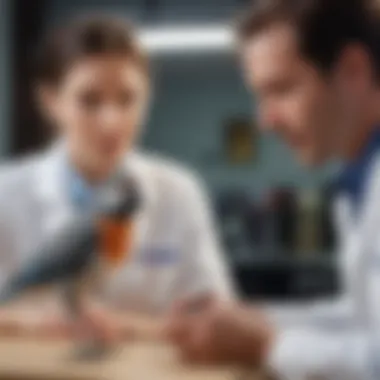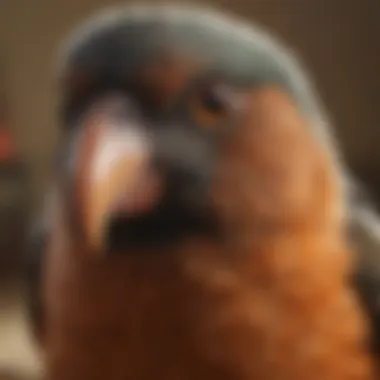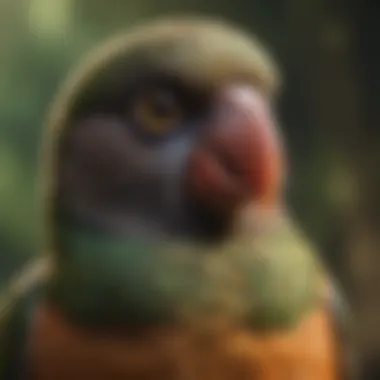The Impact of the Association of Avian Veterinarians on Pet Bird Care


Intro
The care of pet birds has gained considerable attention over the years. This growing focus aligns with the efforts of organizations like the Association of Avian Veterinarians (AAV). Their work significantly impacts avian health and public awareness. Understanding the role of the AAV can help bird owners provide better care and support for their feathered companions.
Understanding Your Pet
Understanding your pet bird is essential for effective care. Birds are unique creatures with specific behaviors and needs. By knowing your pet's characteristics, you can create a comfortable environment that promotes their health.
Pet Behavior Basics
Birds communicate differently than other pets. Observing their body language is crucial. For instance, a puffed-up bird may be cold or stressed. Learning to interpret these behaviors helps you respond appropriately.
Common Breed Characteristics
Different bird species often exhibit diverse traits. For example, parakeets are social and playful, while cockatiels may be more reserved. Recognizing these breed differences helps tailor your care approach.
Species-Specific Needs
Each species has unique requirements. Some birds need more social interaction, while others thrive on solitude. Understanding what your pet bird needs ensures their well-being and happiness.
Pet Care and Maintenance
Routine care is vital for any pet. For birds, this includes nutrition, grooming, and hygiene. Following proper guidelines can prevent many health issues.
Feeding Guidelines
A balanced diet is imperative. Seed mixtures can be part of their nutrition, but fresh fruits and vegetables are also important. Consider foods like leafy greens and berries for optimal health.
Grooming Essentials
Grooming birds is often overlooked. Regular nail trimming and beak maintenance prevent injuries. Bathing can help maintain their feathers, keeping them clean and healthy.
Hygiene Practices
Maintaining a clean environment is essential. Regularly cleaning cages and perches helps control bacteria and pests. This practice reduces the risk of illness, contributing to overall health.
Training and Development
Training your pet bird can strengthen your bond. It enables better interaction and understanding between you and your feathered friend.


Basic Commands and Skills
Teaching basic commands, like
Understanding the Association of Avian Veterinarians
The Association of Avian Veterinarians (AAV) is a pivotal entity in the realm of pet bird care. Its role extends beyond simple medical attention for birds. This organization plays a critical part in establishing standards, providing educational resources, and fostering an informed community around avian health. Understanding the AAV is essential for pet bird owners who seek to navigate the complexities of avian health and welfare.
History and Establishment of the AAV
The AAV was founded in 1982 by a group of dedicated veterinarians who recognized the need for specialized care in avian medicine. As pet bird ownership increased, so did the necessity for established practices in avian veterinary services. The organization emerged from a desire to improve standards of care and to support veterinarians passionate about avian species.
The establishment of the AAV was significant because it provided a common platform for avian veterinarians to share knowledge and best practices. Early on, the AAV emphasized the importance of continuing education for veterinarians treating birds, as avian health requires unique considerations compared to other pets. This commitment has led to various initiatives, such as conferences and peer-reviewed journals that focus specifically on avian medicine.
Mission and Objectives
The mission of the AAV encompasses multiple objectives to enhance avian health and welfare. Primarily, the organization aims to:
- Promote Avian Health: AAV works tirelessly to increase awareness of avian health issues and the importance of preventive care.
- Educate Veterinary Professionals: Providing educational opportunities for veterinarians is crucial for keeping them informed about the latest practices and advancements in avian care.
- Advocate for Avian Species: The AAV advocates for bird welfare, engaging in efforts that protect avian populations in both domestic and wild environments.
Achieving these objectives is vital for not only improving the health of individual birds but also for fostering an overall humane society towards avian species. The AAV’s initiatives enable members to stay updated on the latest research and standards in veterinary care.
Membership and Community Engagement
Membership in the AAV includes a diverse group of veterinarians, veterinary students, and avian enthusiasts who share a commitment to improving the lives of pet birds. The community aspect of the AAV is vital; it creates a network for professionals to collaborate and share insights on challenges and advancements in avian medicine.
Engagement with the broader community is rigorous. The AAV organizes various events, including workshops and seminars, aimed at educating bird owners. These platforms allow community members to learn about crucial avian care practices. Moreover, the AAV provides resources like newsletters and journals that are accessible to its members.
The emphasis on community engagement not only enhances knowledge but also fosters support for avian welfare initiatives.
Key Contributions of the AAV
The Association of Avian Veterinarians (AAV) plays a critical role in enhancing avian veterinary medicine, providing education, and improving public understanding about pet bird care. Through its various programs and initiatives, the AAV addresses significant issues that pet bird owners encounter while promoting better health and welfare for avian species. This section outlines the key contributions of the AAV, emphasizing its pivotal role in advancing avian health.
Advancing Avian Veterinary Medicine
Avian veterinary medicine is a specialized field that requires unique knowledge and skills. The AAV’s commitment to advancing this area is evident through its continuous efforts to set high standards of practice amongst veterinarians. The association provides resources and guidelines that help veterinarians understand avian physiology, behaviors, and specific health concerns.
By fostering expert training, the AAV encourages veterinary practitioners to expand their knowledge in avian care. This has beneficial outcomes for both the birds and their owners. Modern treatment protocols, surgical techniques, and emergency care practices are continually refined as a result of AAV's influence. This ultimately leads to better treatment outcomes for pet birds, ensuring they receive the best care possible. Furthermore, as avian species become more common as pets, the demand for knowledgeable veterinarians increases.


Educational Programs and Resources
Education is at the forefront of the AAV’s mission. The association produces a wealth of educational materials, ranging from online resources to hands-on workshops that focus on various aspects of avian care. Members and the public alike benefit from access to these resources, which cover topics such as bird nutrition, common diseases, and preventive health measures.
The AAV also organizes conferences and seminars that bring together experts in the field. These gatherings promote the sharing of knowledge and insights about the latest advancements in avian care. Such efforts ensure that both veterinarians and bird owners are kept informed about current best practices and new research findings. This fosters an environment of collaboration and continuous improvement in avian veterinary medicine.
Research Initiatives and Publications
Research is a cornerstone of the AAV’s contributions to avian health. Through various research initiatives, the association aims to identify emerging trends, diseases, and treatment options relevant to pet birds. Publications produced by the AAV include peer-reviewed journals, articles, and newsletters that disseminate critical findings within the community. These publications serve to inform both vet professionals and pet owners about important advancements.
By encouraging and supporting research, the AAV helps bridge the gap between theoretical knowledge and practical application. Findings from studies often result in new guidelines that improve the welfare of pet birds, enhancing their overall health and quality of life. Thus, both avian practitioners and pet owners gain immensely from the AAV's dedication to rigorous scientific inquiry and knowledge dissemination.
“The AAV’s efforts in research and education directly translate to better health outcomes for our pet birds and greater awareness among owners.”
Challenges in Avian Health Care
Avian health care is a complex field, often marked by unique challenges that pet bird owners must navigate. Recognizing these challenges is essential for ensuring a successful and healthy relationship between birds and their human companions. The Association of Avian Veterinarians (AAV) plays a crucial role in addressing these issues, providing insights and resources that help overcome obstacles faced by bird owners.
Best Practices in Avian Care
Understanding best practices in avian care is essential for ensuring the health and well-being of pet birds. These practices are derived from extensive research and experience within the avian veterinary field. They cover various aspects of a bird's life, impacting both their physical health and emotional well-being. Following these guidelines can help pet owners provide an ideal environment and lifestyle for their birds, ultimately enhancing their quality of life.
Nutrition and Diet for Pet Birds
A proper nutrition plan is foundational for the health of pet birds. Diets that lack essential nutrients can lead to serious health issues. A well-balanced diet should include a variety of items such as seeds, pellets, fruits, and vegetables. The availability of fresh water is also crucial.
Factors to consider include:
- Species-Specific Needs: Different pet bird species have varying dietary requirements. For instance, large parrots like macaws often need a more diverse diet than smaller finches.
- Fresh vs. Processed: Fresh fruits and vegetables should make up a significant part of the diet. Processed seed mixes may lack vital nutrients.
- Supplementation: Depending on diet, sometimes vitamins and minerals may be needed. Consult an avian veterinarian for personalized recommendations.
Benefits of Proper Nutrition
Good nutrition promotes:
- Strong Immune System: A balanced diet helps boost immunity against diseases.
- Healthy Feather Growth: Proper nutrients are critical for maintaining feathers.
- Overall Longevity: Birds with good dietary habits tend to live longer healthier lives.
Physical and Mental Enrichment
Birds in captivity often face challenges that can lead to boredom and stress. Therefore, providing physical and mental enrichment is vital. Engaging activities and environmental stimulation can help replicate their natural habitat.


Key elements of enrichment include:
- Toys and Gadgets: Rotating toys can foster exploration and engagement. Enrichment toys that require clever interaction can stimulate a bird’s intellect.
- Flight Opportunities: Allowing birds to fly freely in a safe environment can provide physical exercise and mental excitement. Caging should never restrict a bird's need for movement completely.
- Social Interaction: Many birds are social creatures. Interacting with their owners or other birds can prevent loneliness.
_
Public Awareness and Outreach Programs
Public awareness and outreach programs play a crucial role in enhancing the understanding of avian care among pet owners. These initiatives are designed to educate the public about the specific needs and welfare of pet birds. More informed owners can lead to better care practices, which ultimately improves the overall health and longevity of these animals.
Community Workshops and Seminars
Community workshops and seminars are an effective means of engaging pet bird owners. These events, often hosted by the Association of Avian Veterinarians, connect avian vets with bird owners. Participants learn about proper bird care, nutrition, and health issues. The hands-on approach helps owners better comprehend the unique requirements of their birds. In addition to presentations, interactive Q&A sessions give pet owners a chance to address specific concerns.
Collaborations with Animal Organizations
The Association of Avian Veterinarians collaborates with various animal organizations to expand its outreach efforts. Partnering with local shelters and rescue groups raises awareness of avian health issues. Joint initiatives can include health fairs and adoption events, where educational materials are shared. This collaboration promotes not just avian welfare but the general understanding of pet care in the community. It also encourages responsible pet ownership among potential bird adopters.
Advocacy for Avian Welfare
Advocacy is a significant component of the AAV's mission. The association actively addresses legislative issues that impact avian welfare. They work to promote policies that ensure the humane treatment of birds in captivity. Engaging with authorities and educating the public about avian rights helps create a more compassionate society for all pets. Advocacy efforts extend to campaigning against harmful practices and promoting the adoption of pet birds.
"Informed advocacy leads to improved legislation and a better understanding of pet bird needs."
Through these outreach programs, the AAV not only seeks to reduce the knowledge gap surrounding avian care but also fosters a culture of empathy towards these unique pets. The focus extends beyond mere awareness to creating a supportive community where pet owners feel empowered and informed.
Closure
The conclusion section of this article provides significant insight into the essential role of the Association of Avian Veterinarians (AAV) in supporting pet bird care. Understanding the contributions of the AAV is crucial for both bird owners and the veterinary community. The relevance of the AAV extends beyond veterinary care, impacting education, research, and public awareness concerning avian health.
Future Directions for the AAV
The future directions of the AAV emphasize the need for continuous improvement and adaptation in veterinary practices. Upcoming initiatives may include:
- Expanding educational opportunities for veterinarians interested in avian medicine.
- Increasing community outreach programs aimed at enhancing public understanding of pet bird care.
- Developing further collaboration with organizations focused on animal welfare and conservation.
- Enhancing research funding to better understand avian diseases and improve treatments.
The evolving landscape of avian care demands that the AAV remain at the forefront, ensuring that newly discovered information is communicated effectively to both veterinarians and pet owners.
Encouragement for Bird Owners
For bird owners, it is vital to remain informed and proactive regarding the well-being of their pets. The AAV resources offer significant support. Bird owners should:
- Attend workshops and seminars provided by the AAV to expand their knowledge on best practices for pet care.
- Engage with avian veterinarians who are AAV members for routine check-ups and health assessments.
- Stay updated on the latest research findings in avian health care
By taking these steps, bird owners not only enhance the lives of their pets but also contribute to the broader movement of avian welfare. Their engagement ensures a sustainable future for avian medicine, which benefits both birds and their owners.







